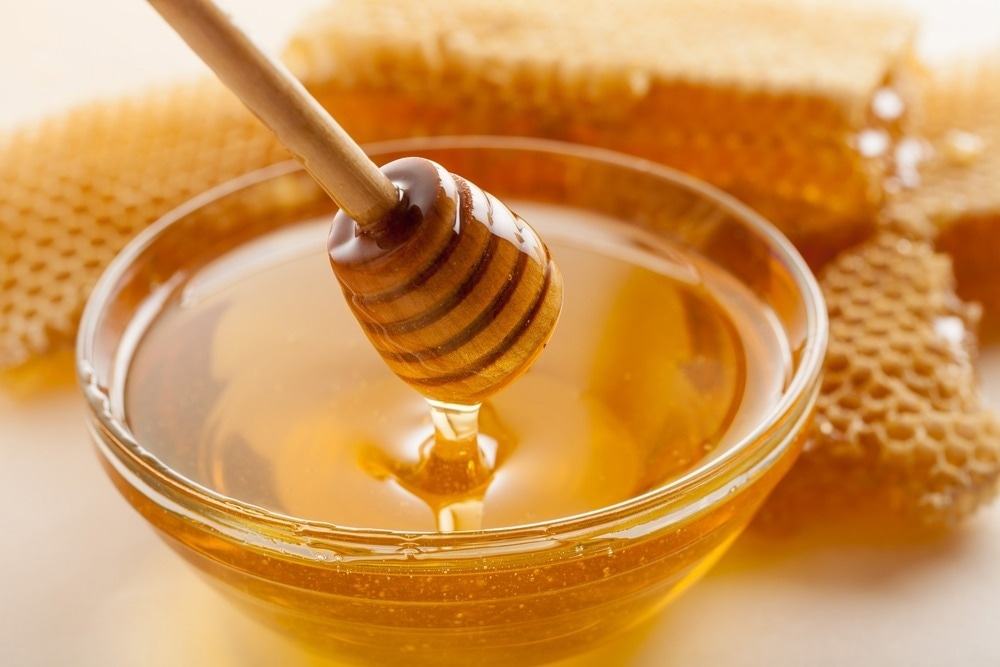In a recent review published in Nutrients, researchers reviewed existing data on the beneficial impact of honey consumption on human health.
 Study: A Comprehensive Review of the Effect of Honey on Human Health. Image Credit: Billion Photos/Shutterstock.com
Study: A Comprehensive Review of the Effect of Honey on Human Health. Image Credit: Billion Photos/Shutterstock.com
Background
Honey, a natural product made by honey bees (Apis mellifera), is a nutritious, healthful food component with a widely diverse composition that depends on the botanic or geographic location.
Honey is primarily composed of various sugars (80.0% to 85.0%), proteins (0.10% to 0.40%), and water (15.0% to 17.0%); however, it also comprises organic acids, enzymes, minerals, phenolic compounds, and vitamins, all of which contribute significantly to its functional and sensory properties.
Honey consumption has been related to anti-inflammatory, antioxidant, antiviral, and antibacterial effects, which have led to an increase in the popularity of this food component.
About the review
In the present review, researchers describe the health benefits of consuming honey for humans.
In total, 48 clinical trials, including 3,655 individuals with a mean age of 30 years, published in English on the Web of Science and Pubmed databases from 1985 to 2022, were analyzed. The studies, including humans, intervened with different types of honey, topical or oral, not combined with other substances, compared to other honey types or sugar sweeteners, concerning the impact on anticancer, cardiovascular, antimicrobial, antidiabetic, antiviral, antioxidant, and anti-obesity outcomes.
Reviews, studies published in non-English languages, studies lacking controls, and those without fully accessible data were excluded from the analysis. After the initial selection, the titles and abstracts were screened, followed by full-text screening and duplicate removal, and the quality of the eligible studies was assessed using the PEDro scale.
Cardiometabolic benefits of honey consumption
Honey's favorable benefits on human well-being have been linked to its high phenolic component concentration. Examples of phenolic acids in honey are syringic acid, hydroxybenzoic acid, protocatechuic acid, gallic acid, vanillic acid, mandelic acid, pheylacetic acid, homogentistic acid, cinnamic acid, coumaric acid, ferulic acid, and rosamarinic acid. Honey also contains flavonoids such as pinocembrin, naringenin, chrysin, luteolin, kaempferol, quercetin, myricetin, and isorhamnetin.
Among healthy individuals, 70g daily of natural and unprocessed honey consumed over a month, compared to sucrose, decreased triglyceride (TG), total cholesterol (TC), low-density lipoprotein (LDL), and fasting blood glucose (FBG) levels and increased high-density lipoprotein (HDL) levels.
Among obese individuals, similar results were obtained, and in addition, C-reactive protein (CRP), body weight (BW), body fat (BF), and body mass index (BMI) were reduced. Forest-thyme-type honey, 15 g daily, consumed over six months, increased oral glucose tolerance (OGT) levels compared to marmalade.
Gold honey of Denmark (from various geographical locations and floral sources), 50 g daily, reduced FBG and FBI levels over two weeks compared to sucrose. Among postmenopausal and diabetic women, Tualang honey provided by the Federal Agricultural Marketing Authorities (FAMA) of Malaysia, consumed in a 20-g daily dose for a year, increased waist circumference (WC) and decreased systolic blood pressure (SBP) as well as diastolic blood pressure (DBP) levels. Among type 2 diabetics, Natural honey from Iran consumed over 8.0 weeks reduced FBG and BW but increased glycosylated hemoglobin (HbA1c) levels.
Among type 1 diabetes patients, unprocessed-type clover honey from Egypt (0.50 mL/kg/day) consumed in two 12-week intervention periods reduced HbA1c as well as FBG values, in addition to reducing subscapular skin fold thickness (SSFT), midarm circumference (MC), triceps skin fold thickness (TSFT), TG, TC, and LDL levels.
Among individuals with hyperlipidemia, 75 g daily of natural honey consumed over 15 days lowered TC, LDL, and CRP levels. In comparison to fructose, 75 g of Basswood honey or natural honey lowered the area under the concentration-time curve (AUC) for glucose and prevented increases in blood glucose levels (BGL), blood insulin levels (BIL), and C-peptide levels.
Pure clover honey and Iranian natural honey reduced energy intake from proteins and fats, whereas increased energy was obtained from carbohydrate intake. In addition, clover honey increased post-prandial insulin and leptin levels, increased satiety rates and thermogenesis, and decreased post-prandial glucose and ghrelin levels.
Other health benefits of consuming honey
Freshly harvested Nigerian citrus (Citrus sinensis Osbeck) honey from the delta region of the river Niger can decrease alcohol blood alcohol clearance rates and the time and extent of intoxication, but it can also increase TG levels and blood pressure. Among head and neck cancer patients, honey types such as natural Iranian Baran-Baghro honey, thyme honey, Western Ghats Forest honey, Malaysian tea plant honey, and active manuka honey can reduce mucositis severity.
Honey mouthwashes or rinse-and-swallow applications can also decrease Candida colonization, oral dryness, and dysphagia. Honey can improve neutrophil and thrombocyte counts and hemoglobin levels among neutropenic patients. Among children with acute lymphoblastic leukemia, 2.50 g/kg twice weekly reduced febrile neutropenia episodes, the number of hospitalized patients, the duration of hospital stay, and improved hemoglobin levels.
Honey use (Buckwheat honey, Iranian natural honey, Eucalyptus, citrus, or Labiatae honey, Nairobi dark honey, Acacia honey, Kimia honey, and Golha honey) can also lower cough frequency and severity and improve sleep quality.
Honey intake can lower bacterial gastroenteritis recovery time, reduce dental plaque, reduce candidal inflammation, discharge, and related itching, and improve wound healing. Among patients with diabetic foot ulcers, clover honey application can reduce the size, grade, and stage of ulcers.
Among individuals with blepharitis, manuka honey use can reduce the microbial burden and dry eye symptomatology and improve tear film and ocular surface quality. Buckwheat honey can improve plasma phenolic concentration and antioxidant capacity among healthy individuals.
To summarize, based on the review findings, honey use could lower TC, TG, and LDL levels, increase HDL levels, prevent increases in BGL and BIL, lower alcohol intoxication time, reduce mucositis severity, reduce cough frequency and severity, and improve sleep quality and wound healing.